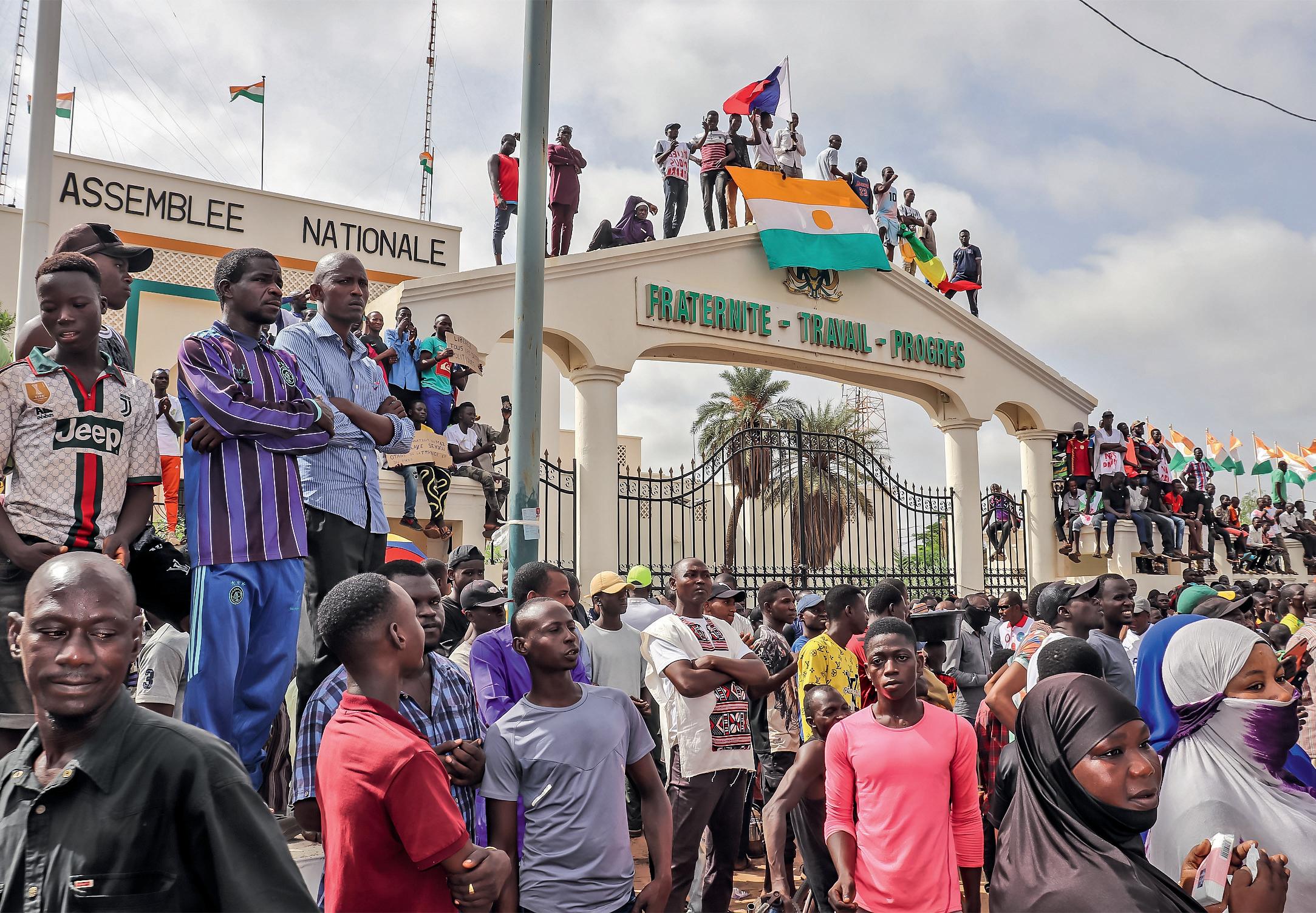
The traveller's route would take them from the northern Ethiopian region of Tigray, at war until last year, then across Sudan, where an internal power struggle within a repressive regime has metastasised into violence, and into the Central African Republic, now seen by many as the best example of the worst that can befall a nation.
After this comes a difficult choice. A northern route could go via Chad, ruled by a 39-year-old soldier who seized power in 2021 when his father was killed in battle after three decades in power, and Mali, racked by insurgencies, Islamic extremists and Russian mercenaries hired by the second military ruler to take power in recent years. Another itinerary could take in Cameroon, convulsed by a civil war, and Burkina Faso, which suffered two military coups in 2022 alone. Either way, our traveller would need - along with some expensive insurance and much luck the means to cross the state of Niger, which has become the latest country to fall prey to what now appears to be endemic instability.
Quite what triggered this upheaval in the Sahel remains unclear. Only months ago, the US secretary of state, Antony Blinken, described Niger as a "model of democracy". This was based on the success of its president, Mohamed Bazoum, a broadly pro-western moderniser who won more than 55% of the vote in elections in 2021 to become the country's first leader to take power peacefully since independence from France in 1960.
Denne historien er fra August 11, 2023-utgaven av The Guardian Weekly.
Start din 7-dagers gratis prøveperiode på Magzter GOLD for å få tilgang til tusenvis av utvalgte premiumhistorier og 9000+ magasiner og aviser.
Allerede abonnent ? Logg på
Denne historien er fra August 11, 2023-utgaven av The Guardian Weekly.
Start din 7-dagers gratis prøveperiode på Magzter GOLD for å få tilgang til tusenvis av utvalgte premiumhistorier og 9000+ magasiner og aviser.
Allerede abonnent? Logg på

Cutting a dash
Scissor Sisters are reuniting to celebrate 20 years since their debut album. They talk fans, Elton John and connecting with the UK's weird’ energy

How art led resistance to Pakistan's dictatorship
A dazzling exhibitionin Qatar reveals how the repressive regime of Zia-ul-Hag led prompted a powerfulcreative defiance

The death of the middleclass professional spells danger for Labour
What does it mean to have a middle-class, white-collar professional job?

I love travelling Europe by train, but a joined-up approach is needed
Last August, I took the train from Trieste to Ljubljana, following a route once used by the Orient Express.

How will 2025 turn out? The life of Jimmy Carter offers us a clue Jonathan Freedland
How will we look back on 2025? Or, if that seems too absurd a question to ponder just a few days into the new year, how might we view the first quarter of the 21st century? As it happens, the answer to both questions is the same and it was confirmed by an event that came as the old year faded and the new one began.

15 ways to overcome overwhelm
Readers and wellbeing experts share tips on corralling chaos and avoiding anxiety, from journalling to cherishing nature

Overwhelmed? Here's how to fix it
Modern life is exhausting. Here, Guardian writers explain what they have given up to make space in their schedules and lives from social media to makeup to news addiction. Then, readers and experts offer tips on how to navigate the demands and pressures we all face. First, Emine Saner examines why we are so overwhelmed

Seoul standoff Impeached president fights on despite arrest attempt
South Korean anticorruption officials attempting to arrest the country's suspended president, Yoon Suk Yeol, must know by now what he meant by his repeated vows to \"fight to the end\".

'Don't feed the troll': European leaders hit back at Musk
When the German chancellor, Olaf Scholz, was asked in an interview about the barrage of insults being directed at him and other German leaders by Elon Musk, the world's richest man, his reply was: \"Don't feed the troll.\"

History lessons The two steps that could stop societal collapse
Academic Danilo Brozović says studies of failed civilisations all point in one direction-the need for radical transformation to survive